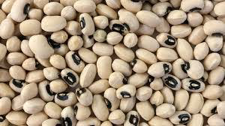The Savanna Agricultural Research Institute (SARI), under the Council for Scientific and Industrial Research (CSIR), is working to introduce the first genetically modified/biotechnology cowpea (beans) seed to farmers for the 2021/22 crop season.
The new variety is to solve an age-old insect pest problem – the Maruca vitrata or the Legume pod-borer, which not only reduces the yield of farmers by some 80 percent but also exposes the crop to tonnes of insecticides that reduces its nutrients and can lead to food-poisoning.
According to the Principal Investigator of the Pod-borer Resistant (PBR) Cowpea Project, Dr. Jerry Nboyine of CSIR-SARI, the new Biotechnology Cowpea Seed (BT Cowpea) which has been tested in a confined area, has proven to be strong over the pest and offers higher yields – which will not only lead to a reduction in cost of cultivation but also increase earnings from the crop.
Already, the Institute has prepared a comprehensive document on the results during trials of the seed and will next month present it to the National Biosafety Authority (NBA), the regulatory body in charge of exercising general supervision and control over the transfer, handling and use of genetically modified organisms (GMOs).
The NBA, upon receiving the documents, is expected to cross-check and ascertain the veracity of all findings in the document and give recommendations. The NBA is also mandated to announce to the general public the intent of SARI and receive empirical feedback that will be factored into the recommendations.
The development will expectedly lead to issuance of a permit for SARI to plant the BT Cowpea in different agro ecologies so farmers can attest to the benefit over current seed. Then the result will be presented to the National Varietal Release and Registration Committee (NVRRC), which will also conduct research to ascertain all of the BT Cowpea’s properties before recommending the seed to be added into the national seed-basket.
BT Cowpea Nutrients
Dr. Nboyine told the B&FT in an interview that the move “is really important, because traditionally cowpea or beans is called the poor man’s protein; so if you cannot have meat in your meal but you have cowpea it takes care of your protein needs”. For him, the crop has great prominence in the sub-region, and Ghana can become a net exporter to support the nutrition needs of other countries – especially francophone neighbours.
Yield projection
Dr. Nboyine added that: “The yield farmers get on average is about 500kg per hectare, which means that a cowpea farmer would get five maxi-bags after cultivating over 2.5 acres of land; meanwhile, a maize farmer can get as much as 20 maxi-bags per hectare. That is how bad it is, so that is why cowpea is getting very expensive in the country”.
He added that the hope is to achieve a minimum of 1.7 tonnes per hectare, which translates into about 17 maxi-bags. He noted that, conventionally, the farmer would have spent over GH¢400 on chemicals; but with BT cowpea he will be spending GH¢80 on chemicals, thus reducing cost of production.
Nigeria threat
Speaking at a media engagement organised by the African Agricultural Technology Foundation (AATF) to enlighten journalists on the various stages of the PBR Cowpea Project in Ghana, Former Director General for the CSIR, Prof. Walter Sandow Alhassan, said there is a looming threat of farmers smuggling the seed in from Nigeria due to the good results achieved after its commercialisation by the government of Nigeria.
This development places Nigeria as the first country ever to commercialise genetically improved cowpea. According to Prof. Sandow Alhassan, if care is not taken and Nigerian genetically improved cowpea enters Ghana, it will be difficult to monitor and assess its improvement in order to offer farmers the requisite knowledge to handle the seed so as to achieve the maximum benefit.










